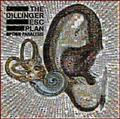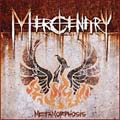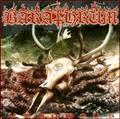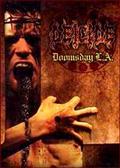JUDAS PRIEST (uk) - Point Of Entry (1981)

Label : Columbia Records
Sortie du Scud : 26 février 1981
Pays : Angleterre
Genre : Heavy Rock
Type : Album
Playtime : 10 Titres - 37 Mins
Fort du succès de British Steel, JUDAS PRIEST prend conscience de l’impact que peut avoir une chanson comme « Living After Midnight » sur le public et les ondes, et se met en tête de composer son nouvel album dans cette optique. On pourrait voir Point Of Entry comme un besoin de respirer, de s’éloigner un peu du Heavy Metal forgé depuis 6 albums … Mais l’objectif à peine dissimulé est de squatter les radios et de conquérir le marché US, plus propice à accueillir des mélodies faciles et autres titres plus « fun ». Après tout, JUDAS a toujours aimé ces titres dits plus accessibles (comme « Evening Star » sur Killing Machine) mais en les intégrant habilement au sein de setlists plus couillues. En aucun cas son public n’est préparé à recevoir un album aussi « facile » dans les oreilles …
Tout commence bien, cela dit, avec un « Heading Out To The Highway », mettant en avant un Halford très en voix, un Dave Holland bien en place et les twin guitars savoureuses de Downing et Tipton. Or dès « Don’t Go », le doute n’est plus permis : ça y est, JUDAS PRIEST a cédé aux sirènes de la guimauve commerciale … Et même si l’énergique « Hot Rockin’ » parvient à créer l’illusion, il faut bien admettre que cette orientation ne s’avère pas très concluante : il n’y a pas titre plus affligeant que « You Say Yes » dans le répertoire de JUDAS PRIEST. Rien que les paroles : « you say yes … I say no … » … Pas de commentaires … Et « Turning Circles » ? Même le riff faiblard lui prête une connotation très « chiffe molle », comme ces « ah aaah, ah aaah » ridicules. Quant à « All The Way », il sonne comme un mauvais STATUS QUO.
Heureusement, le bon « Troubleshooter » qui ne ferait pas tâche dans le répertoire d’AC/DC permet à JUDAS PRIEST d’éviter le désastre. Et le final « On The Run » revient à son Heavy Rock à lui, celui qui fait taper du pied et secouer la tête, avec un Halford qui retrouve de sa superbe. Quant à « Desert Plains » et « Solar Angels », ils évoquent un JUDAS PRIEST un peu plus planant, plus aéré mais inspiré, ce qui ne représente pas une mince affaire sur un album pareil.
On peut considérer Point Of Entry comme une première « trahison », mais surtout comme le premier échec artistique de JUDAS PRIEST. De plus, la New Wave Of British Heavy Metal bat son plein, le nouveau venu IRON MAIDEN se fait très menaçant, et le PRIEST perd du terrain.
L’heure de la Vengeance a sonné...
Discographie Complète de JUDAS PRIEST :
Rocka Rolla (Album - 1974),
Sad Wings Of Destiny (Album - 1976),
Sin After Sin (Album - 1977),
Stained Class (Album - 1978),
Hell Bent For Leather (Killing Machine) (Album - 1979),
Unleashed In The East (Live - 1979),
British Steel (Album - 1980),
Point Of Entry (Album - 1981),
Screaming For Vengeance (Album - 1982),
Defenders Of The Faith (Album - 1984),
Turbo (Album - 1986),
Priest ... Live! (Live - 1987),
Ram It Down (Album - 1988),
Painkiller (Album - 1990),
Metal Works '73-'93 (Best-Of - 1993),
Jugulator (Album - 1997),
Meltdown (Live - 1998),
Demolition (Album - 2001),
British Steel (DVD - 2001),
Live In London (DVD - 2002),
Live In London (Live - 2003),
Electric Eye (DVD - 2003),
Angel Of Retribution (Album - 2005),
Rising In The East (DVD - 2005),
Nostradamus (Album - 2008),
A Touch Of Evil: Live (Live - 2009),
British Steel - 30th Anniversary Deluxe Edition (Album - 2012),
Redeemer Of Souls (Album - 2014),
Battle Cry (Live - 2016)
Ajouté : Mercredi 09 Septembre 2009
Chroniqueur : NicoTheSpur
Score :   
Lien en relation: Judas Priest Website
Hits: 12315
|














